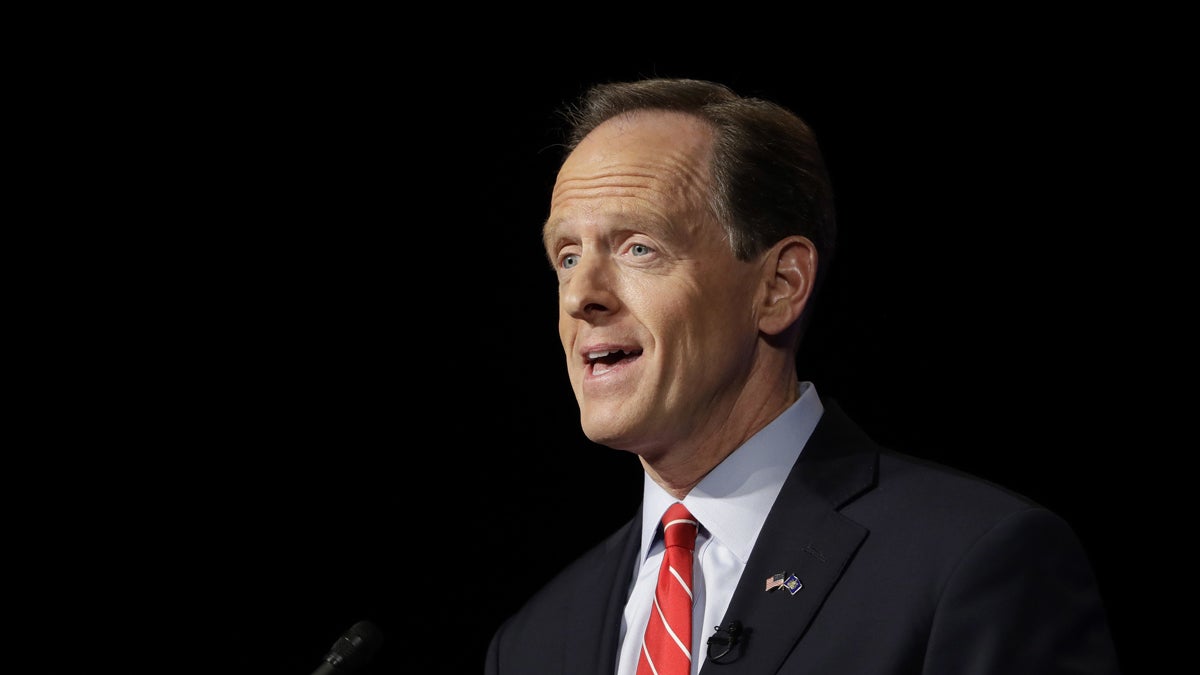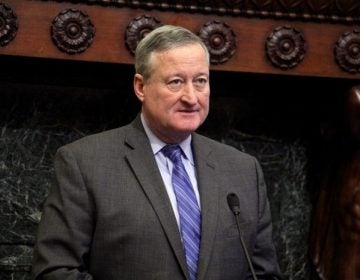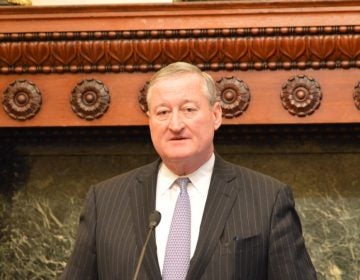In fighting sanctuary cities, Pat Toomey acts against his own history

Republican U.S. Sen. Pat Toomey is shown debating against his Democratic challenger Katie McGinty in October at Temple University in Philadelphia. (AP Photo/Matt Rourke
In December 1911, Wilbur Franklin Phelps was finishing up his first year publishing The Menace. Phelps was “courteous, kindly, and approachable,” a colleague wrote, the Sunday school sort who wore a white collar, tiepin, and a meticulous mustache. But the modest demeanor disguised a vitriolic agenda.
Did people get it? He wanted to know. Nearly 8.8 million immigrants had entered the United States in the decade before 1911; the country was under siege. “America today is not only facing the most momentous issue in her history, but the issue is one that cannot possibly be long evaded. It is imminent,” he wrote in the Dec. 23 issue of The Menace. “This crusade for the express purpose of making America Catholic is now and has been for years carried on here in every direction and in many ways.”
The Pope, the Catholic hierarchy, priests, women religious, and the masses — from Italy, Ireland, Hungary, Poland — were the target of Phelps’ newspaper, which he put out every Saturday. The Menace traded in fake news and innuendo designed to inflame hatred and seed disunity. (Breitbart News, the white nationalist fake news source run by President-elect Donald J. Trump’s advisor, Stephen Bannon, copies The Menace’s approach.) “Taft a Catholic?” Phelps suggested after the president attended a Mass with Latin American leaders. Phelps sent trolls to Catholic neighborhoods to spy on priests. He composed incendiary headlines, accusing the Pope of plotting a takeover, questioning if Catholics could be loyal Americans. Under the Dec. 16 headline “Are Catholics to Control Legislation?” Phelps wrote: “Go after that question of immigration and stay after it until the scum and filth of other nations shall not be allowed to even as much as see our shores, much less have them land here to murder and debauch our people.”
Just a few years before Phelps, who was born in Ontario and entered the United States as an immigrant, began publishing The Menace, a woman named Catherine McCarthy traveled by ship from Queenstown, Ireland, to Boston. McCarthy had been living in Clonakilty, County Cork, before setting out on the S.S. Saxonia on Sept. 18, 1907. Within a year of arriving in the United States, McCarthy had married another Irish Catholic immigrant, Patrick Toomey.
In 1910, according to the U.S. Census, Catherine Toomey was working as a domestic servant for an Irish immigrant silversmith, Dennis Griffin, and his wife Mary, in Providence, Rhode Island. She’d just had a son, Joseph, who she would raise with the Griffins’ newborn son, Dennis. Joseph would become a machine hand at a leather factory and around 1928 marry the newly immigrated Helen Sullivan. Their son, Patrick J. Toomey, would marry Mary Ann Andrews, granddaughter of Portuguese immigrants from the Azores islands. Their son, Patrick J. Toomey, is the junior U.S. senator from Pennsylvania, who last week threatened to cut off federal funds to Philadelphia as punishment for the city’s policy not to collude with federal immigration enforcement.
In provocative language hardly different from Phelps’, he said, about cases that appear to be unrelated to the city’s sanctuary city policy, “How can this possibly happen? That a city would knowingly, willfully, and repeatedly choose to release dangerous criminals, including child molesters, who don’t even have a right to be in the United States in the first place because they came here illegally.” (The crime rate among first-generation immigrants is substantially lower than it is among native-born.)
Senator Toomey’s paternal great-grandparents, Patrick and Catherine, migrated to New England a few years after his maternal great-grandparents, Anna Duart, who arrived in 1903, and John Andrino, who arrived in 1901. Toomey’s Portuguese ancestors were also Catholic.
East Coast ports received most of the 8.8 million who sought economic, religious, or political freedom in the U.S. that decade when, according to federal law, nearly every immigrant (excluding Chinese) was given legal sanctuary by cities that, then as now, were hungry for their skills, hard work, and determination.
In 1911, when foreign-born people comprised 14.7 percent of the U.S. population, state officials — in Pennsylvania as well as Rhode Island — encouraged immigrants to become citizens. Depending on the state law, a newly arrived American might have to prove literacy in any language or English proficiency. But some immigrants remained “aliens,” without citizenship status. Senator Toomey’s great-grandfather, John Andrino, never became a citizen; by 1940, 37 years after arriving in the U.S., Andrino’s widow Anna, who could not speak or read English, had remained an unnaturalized alien, as did Sen. Toomey’s paternal grandmother, Helen, in the U.S. for 13 years. (Helen entered the U.S. as an immigrant after strict quotas were put in place. It isn’t clear if she entered as a “legal” immigrant.)
Today, there are about 42.4 million immigrants residing in the United States, according to the Migration Policy Institute, 13.3 percent of the population. Of the 42.4 million, about 11.4 million are undocumented — people who have outstayed a visa or who entered without going through border control. Despite the political rhetoric, this number isn’t growing. For the past few years, Sen. Toomey has stayed after the issue of immigration, refusing to back bipartisan compromise legislation that would have provided a path to citizenship for undocumented immigrants, and in June he introduced the “Stop Dangerous Cities” bill, which he hopes to revive in the new Congress, to cut off federal funding to sanctuary cities like Philadelphia.
“Sanctuary cities are an urgent public safety concern, and they are one of the worst examples of how blind adherence to a politically correct ideology can put our citizens at risk,” he said during an October debate with Katie McGinty, a Democrat who unsuccessfully challenged Toomey for his seat in the Senate. Given this inflamed language, we might wonder if the Senator would consider Anna, his great-grandmother, or Helen, his grandmother, “illegal.” Would he say, with a contempt that belies his reputation as a moderate, “They have no right to be here”?
—
Nathaniel Popkin is an author and editor.
WHYY is your source for fact-based, in-depth journalism and information. As a nonprofit organization, we rely on financial support from readers like you. Please give today.



